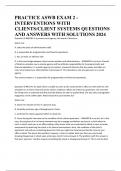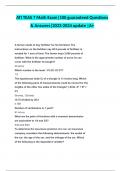PRACTICE ASWB EXAM 2 -
INTERVENTIONS WITH
CLIENTS/CLIENT SYSTEMS QUESTIONS
AND ANSWERS WITH SOLUTIONS 2024
Question ID #48188: In a private social agency, the board of directors:
Select one:
A. takes the place of administrative staff.
B. is responsible for programmatic and financial operations.
C. has, at most, an advisory role.
D. is the main bridge between direct service workers and administrators. - ANSWER B is correct: A board
of directors presides over a private agency and has ultimate responsibility for its programmatic and
financial operations. In a public agency, by contrast, a board of directors has less power and takes on
more of an advisory or administrative role.Answer D: This describes a role of supervisors in a social
agency.
The correct answer is: is responsible for programmatic and financial operations.
Question ID #47170: An adult client is unable to come to the social worker's office to meet with her. She
schedules an in-home interview at the client's residence. When she enters his apartment, she sees that
the living room is cluttered and dirty and she detects an odor of spoiled food. She also sees pornographic
magazines on the coffee table. What should the social worker do?
Select one:
A. Share her reaction to this in a genuine way.
B. Carefully avoid any sign of disapproval or shock.
C. Confront the clients apparent effort to shock her.
D. Focus during the interview on the condition of the clients apartment. - ANSWER B is correct: As in this
case, the purpose of an in-home interview may be to engage and deliver services to a client when he
can't or won't meet you in an office setting; other home visits are conducted to obtain a more accurate
assessment by observing the client in his natural environment. Here, the condition of the client's
apartment may tell you something about him that you might not have learned had he come to your
office instead. The key to this question, however, is that no matter what you find, you must avoid
showing disapproval or shock upon entering a client's home.Answer A: The problem with this answer is
that your "genuine" reaction may be something like shock or disapproval.Answer D: This is not the best
,answer because it suggests that you would set aside the original purpose of your home visit. You
wouldn't do this unless you found that the client was in danger.
The correct answer is: Carefully avoid any sign of disapproval or shock.
Question ID #47141: What is the primary focus of interventions made by child protective service
agencies?
Select one:
A. Identifying maltreating families in order to protect children.
B. Making sure abusive families under pressure have access to supportive services.
C. Rehabilitating abusive parents.
D. Protecting children from maltreatment. - ANSWER C is correct: The foremost goal of child protective
services (CPS) is the protection of abused and neglected children, as "D" says. The question, however, is
about interventions made by CPS: Interventions for child abuse and neglect are primarily therapeutic,
rather than punitive, and their primary goals are to treat and rehabilitate the parents and, where
possible, keep families intact.Answer B: This is too narrow: These agencies offer supportive services to
families (e.g., respite care, day care), but they also provide concrete services (e.g., housing, economic
assistance) and therapy, and they don't emphasize any one service over the others. Instead, they meet
the specific needs of each family.
The correct answer is: Rehabilitating abusive parents.
Question ID #47033: A social worker meets with a 35-year-old client who has a history of heavy alcohol
use and is experiencing symptoms of moderate depression. The client is currently using alcohol on a
daily basis to the extent that he is intoxicated on most days. What is the BEST way for the social worker
to approach treatment in this case?
Select one:
A. Deal with the depression before addressing the alcohol use.
B. Deal with the alcohol use before addressing the depression.
C. Treat both disorders now.
D. Deal with the emotional issues underlying the disorders. - ANSWER B is correct: When a client who is
known to be a heavy alcohol user has prominent symptoms of depression, it can be important to get a
psychiatric history. On the other hand, heavy or frequent alcohol use can exacerbate other psychological
problems, and these problems often diminish during recovery. Therefore, many experts recommend that
an evaluation of independent mental disorders should occur after the client has been off of all
substances for at least one month. This client is described as having "symptoms of moderate
depression." When a person with alcohol use disorder has non-severe co-occurring psychiatric
, symptoms, it's common to have them participate in treatments for their addiction first and then
treatments for the psychiatric disorder. You might have been able to determine that it would be best to
treat the alcohol use first even if you didn't know this - i.e., the client's heavy drinking may be
endangering his physical health and safety and his symptoms of "moderate" depression may be related
to his alcohol use and may remit partially or completely after he stops drinking.Answer A: This would be
the recommended approach if the client had a severe co-occurring psychiatric disorder, rather than
moderate depression. That is, when a client with alcohol use disorder has a severe co-occurring
psychiatric disorder (e.g., a psychotic disorder, an episode of major depression), then you should treat
the latter disorder first - i.e., you should stabilize the client before beginning addiction treatment.Answer
C: Parallel treatments, in which the addiction and co-occurring psychiatric disorder are treated
simultaneously, are more commonly provided when the client has more serious psychiatric symptoms
than this client has - i.e., when a client has psychiatric symptoms that would make it difficult for him to
participate
Question ID #47583: A social worker is working in individual therapy with a 10-year-old child who has
been placed in foster care due to neglect at home. This disruption has been difficult for the child and
she's worried about her parents' well-being. The child asks the social worker what will happen in the
future and whether she will ever go back to her parents' home. How should the social worker respond to
this child's questions?
Select one:
A. Give optimistic answers and withhold information that might upset her.
B. Explore what underlies her questions before answering.
C. Reassure her that her parents are safe and are being helped too.
D. Answer her as honestly as he can, with the facts as he knows them. - ANSWER D is correct: Children
who have been removed from their parents' home have experienced separation and loss and often feel
insecure and uncertain. They may blame themselves for the problems that led to their placement and
feel as though they are being punished. And, like this girl, they often worry about the well-being of their
parents. As a result, these children often many have questions about their past, the current situation,
and what will happen in the future. You should make it easy for a child in foster care to ask these
questions and, when responding, should be as factual and honest as possible.Answer C: This doesn't
answer the child's question.
The correct answer is: Answer her as honestly as he can, with the facts as he knows them.
Question ID #47722: The client is a 29-year-old woman who was raped two days ago by a stranger. What
is MOST important for the social worker to do in the first meeting with this client?
Select one:
A. Have the client talk about what happened to her.





